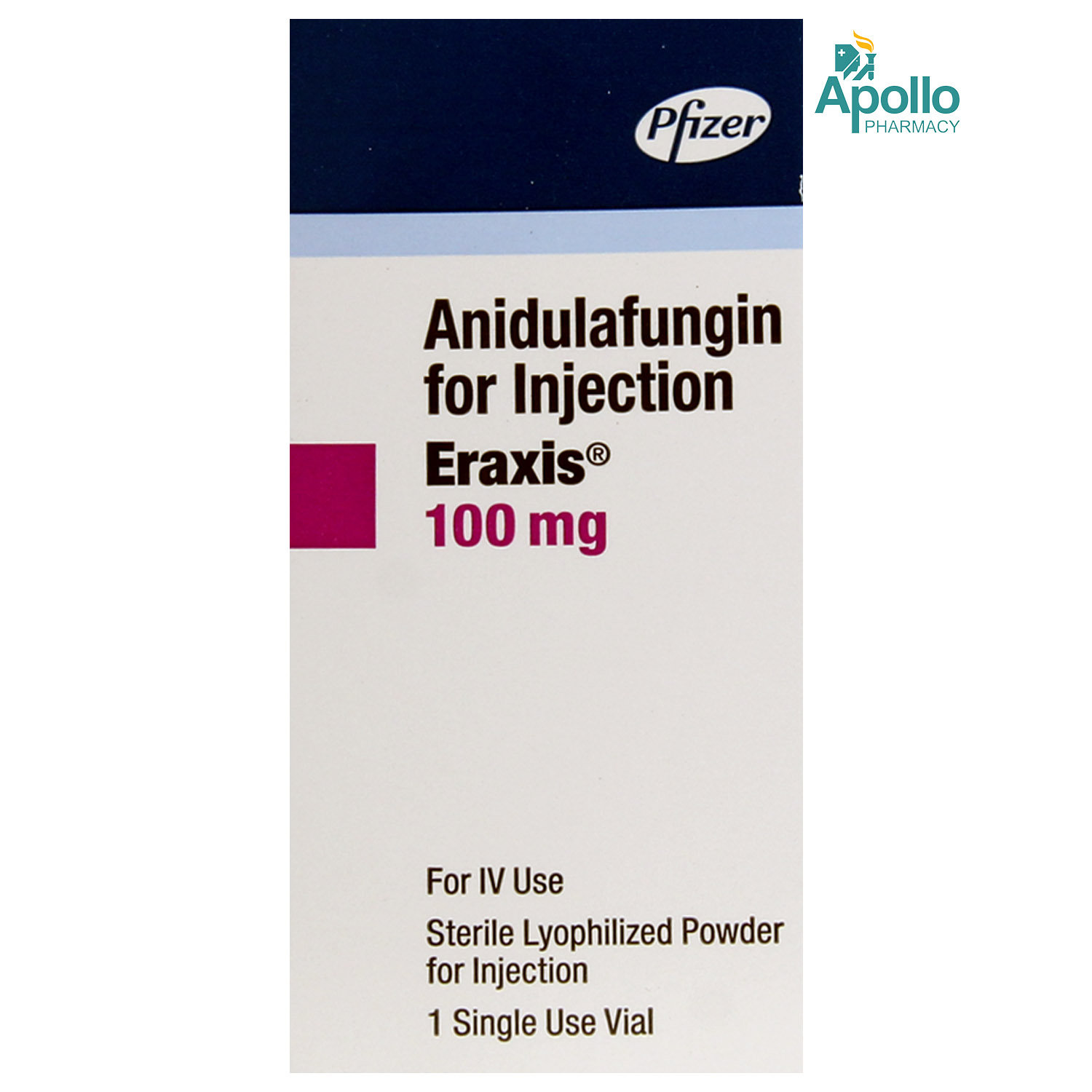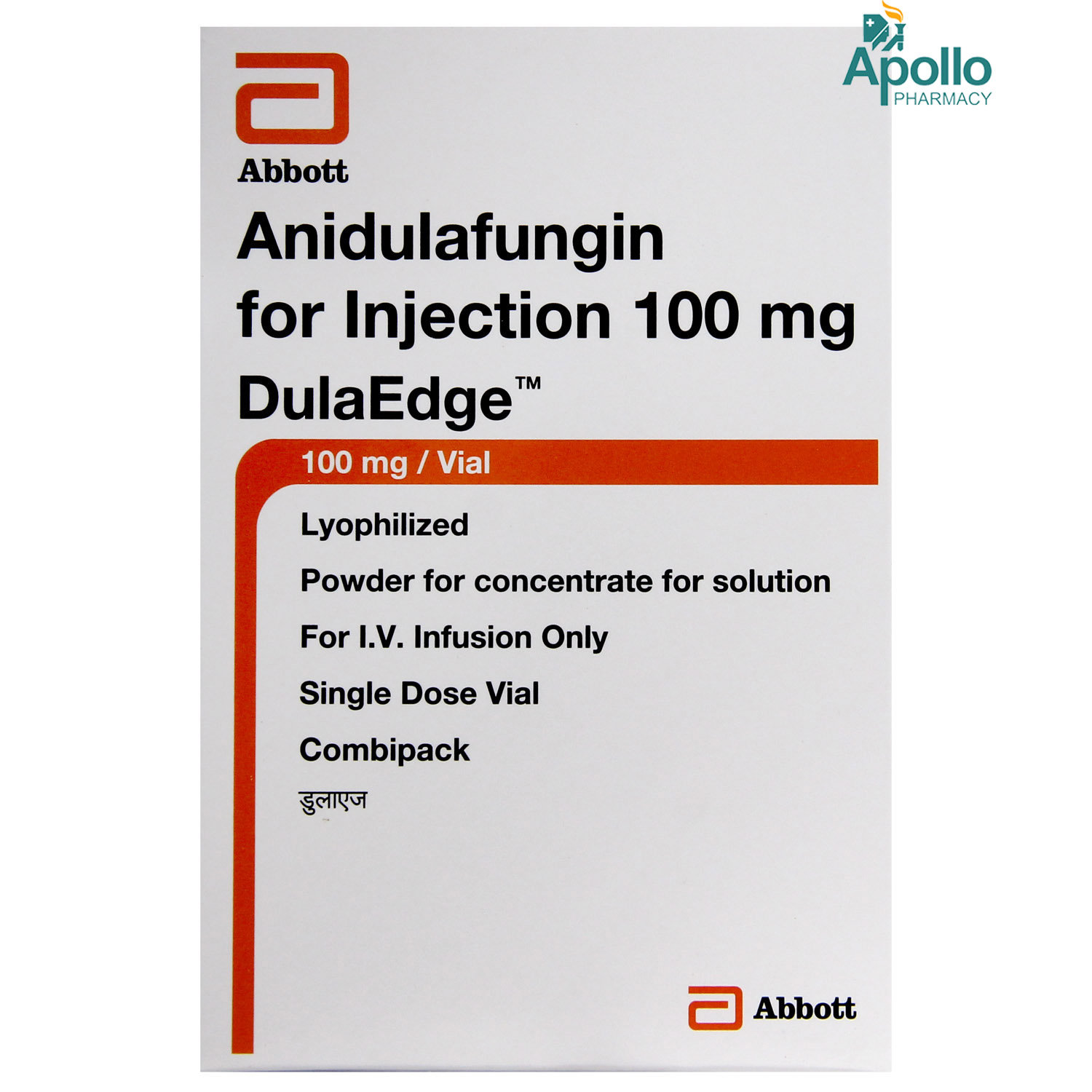Dulavin Injection
MRP ₹9950
(Inclusive of all Taxes)
₹1492.5 Cashback (15%)
Provide Delivery Location
Online payment accepted
 Prescription drug
Prescription drugWhats That
About Dulavin Injection
Dulavin Injection belongs to the class of medicines called antifungals used to treat invasive candidiasis. Invasive candidiasis is a type of fungal infection of the blood or other internal organs caused by yeast (a type of fungus) called Candida.
Dulavin Injection contains Anidulafungin, which works by preventing the normal development of fungal cell walls by making them fragile or unable to grow. Thus, Dulavin Injection kills fungus and helps to treat fungal infection.
Dulavin Injection will be administered by a healthcare professional; do not self-administer. Dulavin Injection may cause common side effects such as nausea, diarrhoea, hypokalaemia (low blood potassium), headache, vomiting, or difficulty breathing. Most of these side effects of Dulavin Injection gradually resolve over time and do not require medical attention. However, if the side effects worsen or persist, please consult your doctor.
Please tell your doctor if you are allergic to Anidulafungin, caspofungin, or any other medicines. Dulavin Injection is not recommended for use during pregnancy. If you are of childbearing age, effective contraception should be used. If you are a nursing mother, take your doctor’s advice before receiving Dulavin Injection.
Uses of Dulavin Injection
Invasive candidiasis
Directions for Use
Dulavin Injection will be administered by a healthcare professional; do not self-administer.
Key Benefits
Dulavin Injection contains Anidulafungin, an antifungal drug which prevents the normal development of fungal cell walls by making them fragile or unable to grow. Thus, Dulavin Injection kills fungus and helps to treat fungal infections of blood or other internal organs.
Storage
- Inform your doctor immediately if you experience a fever after starting a new medication.
- Your doctor may adjust your medication regimen or dosage as needed to minimize fever symptoms.
- Monitor your body temperature to monitor fever progression.
- Drink plenty of fluids, such as water or electrolyte-rich beverages, to help your body regulate temperature.
- Get plenty of rest and engage in relaxation techniques, such as deep breathing or meditation, to help manage fever symptoms.
- Under the guidance of your doctor, consider taking medication, such as acetaminophen or ibuprofen, to help reduce fever.
- If your fever is extremely high (over 103°F), or if you experience severe symptoms such as confusion, seizures, or difficulty breathing, seek immediate medical attention.
- Wear compression garments like stockings, sleeves, or gloves to apply pressure and help stop fluid from building up, especially after the swelling goes down.
- Move around and do exercises to help the fluid circulate, especially in swollen limbs. Ask your doctor for specific exercises.
- Raise the swollen area above your heart level several times a day, even while sleeping, to help reduce swelling.
- Gently massage the swollen area with firm but not painful pressure.
- Keep the swollen area clean and moisturized to prevent injury and infection.
- Reduce salt intake to help prevent fluid from building up and worsening the swelling, as advised by a doctor.
- If the swelling does not get better after a few days of home treatment or worsens, consult your doctor right away.
Drug Warnings
If you are allergic to Anidulafungin, caspofungin or any other medicines, please tell your doctor. Dulavin Injection is not recommended for use during pregnancy. If you are of childbearing age, effective contraception should be used. If you are a nursing mother, take your doctor’s advice before receiving Dulavin Injection. If you develop liver problems during your treatment with Dulavin Injection, your doctor may monitor you more closely for liver function.
Drug-Drug Interactions
Drug-Drug Interactions
Login/Sign Up
Drug-Food Interactions
Drug-Food Interactions
Login/Sign Up
Diet & Lifestyle Advise
Keep your hands clean.
Look for signs of early infection, such as pain or redness where a catheter or IV enters your body.
Be sure that anyone who touches you washes their hands first, including healthcare workers, as washing hands can prevent the spread of germs.
Side Effects of Dulavin Injection
- Nausea
- Diarrhoea
- Hypokalaemia (low blood potassium)
- Headache
- Vomiting
- Difficulty breathing
Habit Forming
Therapeutic Class
All Substitutes & Brand Comparisons
RX
Dulazar 100mg Injection 30ml
Fusion Health Care Pvt Ltd
₹11439
(₹312.67/ 1ml)
96% CHEAPERRX
Anidulan 100 Injection 1's
Mylan Pharmaceuticals Pvt Ltd
₹5950
(₹4879.0 per unit)
40% CHEAPERRX
Out of StockAnidafung 100 mg Injection 1's
Gufic Bioscience Ltd
₹6999
(₹5739.18 per unit)
29% CHEAPER
Author Details
We provide you with authentic, trustworthy and relevant information
Drug-Diseases Interactions
Drug-Diseases Interactions
Login/Sign Up
FAQs
Dulavin Injection contains Anidulafungin, which works by preventing the normal development of fungal cell walls by making them fragile or unable to grow. Thus, Dulavin Injection kills fungus and helps to treat fungal infections of blood or other internal organs.
Invasive candidiasis is not contagious. However, the yeast itself can travel from person to person and on surfaces. It can be spread through healthcare workers' hands or contaminated medical devices.
Dulavin Injection may cause headache as a common side effect. However, if the condition persists or worsens, please consult a doctor.
Disease/Condition Glossary
Invasive candidiasis: It is a type of serious fungal infection that can affect blood, brain, heart, bones, eyes, and other parts of the body. It is caused by yeast (a type of fungus) called Candida. The most common symptoms include fever and chills that do not improve after antibiotic treatment for suspected bacterial infections. Other symptoms can develop if the infection spreads to other parts of the body, such as the brain, heart, bones, eyes, or joints.

Have a query?
Alcohol
Safe if prescribed
The interaction of alcohol with Dulavin Injection is unknown. If you have any concerns regarding this, please discuss them with your doctor.
Pregnancy
Consult your doctor
It is unknown how Dulavin Injection affects pregnant women. Therefore, it is not recommended for use during pregnancy. However, if you are pregnant or planning pregnancy, inform your doctor before receiving Dulavin Injection.
Breast Feeding
Consult your doctor
It is unknown how Dulavin Injection affects breastfeeding women. Therefore, take your doctor’s advice before receiving Dulavin Injection while breast-feeding.
Driving
Safe if prescribed
The effect of Dulavin Injection on driving is unknown. Drive only if you are alert after taking Dulavin Injection.
Liver
Consult your doctor
If you have any concerns regarding the use of Dulavin Injection in patients with liver problems, please discuss them with your doctor.
Kidney
Consult your doctor
If you have any concerns regarding the use of Dulavin Injection in patients with kidney problems, please discuss them with your doctor.
Children
Safe if prescribed
If you have any concerns regarding the use of Dulavin Injection for children, please consult a doctor.
Heart
Dulavin Injection should be used with caution in patients with heart disease. Dose adjustment may be needed in such patients.
Geriatrics
Consult your doctor
Dulavin Injection is generally safe for elderly patients if prescribed and monitored by a doctor.













